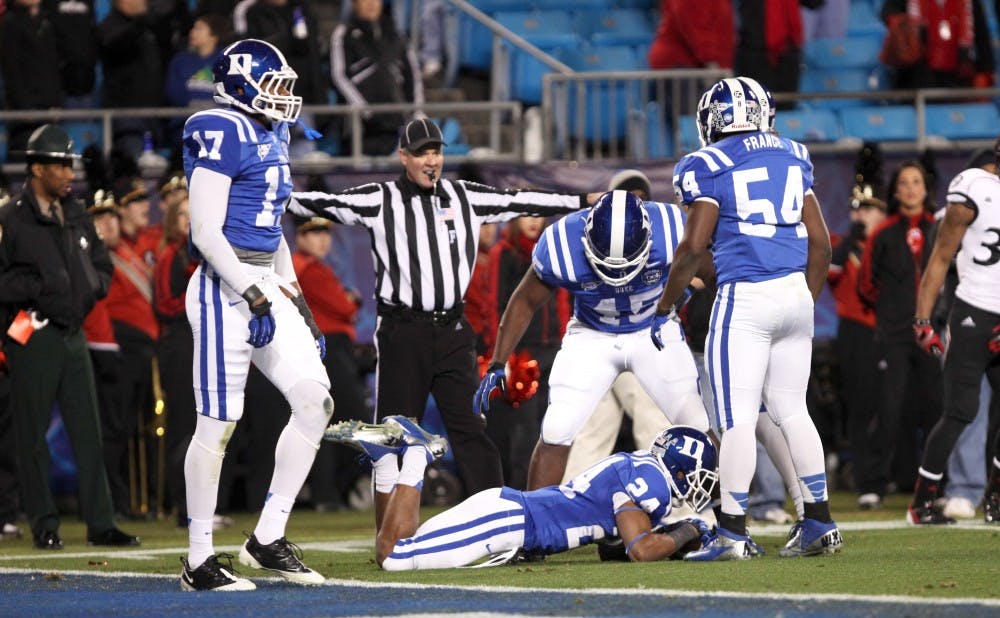Alright, pop quiz.
Duke and North Carolina are competing for the ACC men’s basketball championship in Greensboro, with the winner securing a No. 1 seed in the NCAA tournament. The question: who are the most hated people on the floor? The trap answer is the five Tar Heel players, but let’s remember, our neighbors hate five Blue Devils just as much. It’s not Mike Krzyzewski or Roy Williams either. No, ladies and gentlemen, it’s not the players, coaches, administrators, mascots or fans. It’s the referees.
Since the first officiated sporting event in 1891, the most hated “team” in sports has been the referees. Coaches yell, plead, roll their eyes and occasionally throw objects at officials to get their attention. Fans create countless jeers and snide comments in order to voice their displeasure with particular calls.
I have personally lost my voice several times calmly relaying a well-articulated message to a referee, entirely to no avail. In fact, despite most of the lobbying done throughout a contest, very rarely do you see officials do a 180 and switch their calls. Well, except the 2012 NFL replacement referees (RIP). After all, it’s their job to know the rules better than anyone else.
So why do we persist? It’s because, whether officials admit it or not, there have been too many mistakes seen over and over again in professional sports.
During the past two weeks, there have been numerous occasions where referees, rather than the athletes, have drastically impacted game results.
Nine days ago, Packers Linebacker Clay Matthews hit 49ers quarterback Colin Kaepernick on a third-down scramble when he was clearly out-of-bounds, drawing a penalty. Following the tackle, 49ers tackle Joe Staley participated in some extracurricular activities, also drawing a penalty. The two personal fouls should have been offset, leading to a fourth down for the 49ers and presumably a field goal attempt. Instead, referee Bill Leavy incorrectly ruled to replay third down. The 49ers scored a touchdown on the next play and went on to win.
Three days ago, Arizona State defeated Wisconsin on a bizarre sequence with seconds remaining. The Badgers drove more than 60 yards in a little more than a minute and appeared to take a knee to center the ball and get ready for a possible game-winning field goal try. Wisconsin starting quarterback Joel Stave tripped over a lineman and instead appeared to slam the ball on the ground, which led to 10 seconds of clock runoff that neither team knew how to approach. Noticing the clock was still running despite the confusion, the Badgers attempted to spike the ball but ran out of time.
Parents tell their little athletes that it’s not about winning or losing, but about having fun. What’s fun about having someone that does not physically compete in a game determine the outcome? Both of the aforementioned bad calls are embarrassing, but by no means the first bad calls ever. I think we all remember Armando Galarraga’s 2010 "imperfect" game, don’t we Jim Joyce?
This past summer, soccer fans in Maranhao, Brazil witnessed perhaps the scariest display of conflict between a player and an official in the history of sports. Referee Octavio da Silva Catanhede Jordan fatally stabbed a player, leading to obvious shock and outrage from the crowd. Fans then stormed the field to decapitate Silva and place his head on a stake.
Detroit Tigers' fans may have been outraged when Joyce blew Galarraga's attempt at Major League history, but he at least got to keep his head that night. Score one for America.
So what does the future hold for referees? We have already seen sports such as football and basketball openly embrace instant replay technology. Just this past August, Major League Baseball announced it plans to drastically expand its video review process after a number of incorrect calls were made in games. I truly feel the human element of officiating is important, but perhaps the days of “unfixable” mistakes are finally coming to a close.
The bottom line is that the players and coaches should determine the outcomes of games. If we’ve noticed anything in recent years, it’s that one call can completely change the course of history. Change is coming, and it’s about time.
Get The Chronicle straight to your inbox
Signup for our weekly newsletter. Cancel at any time.

